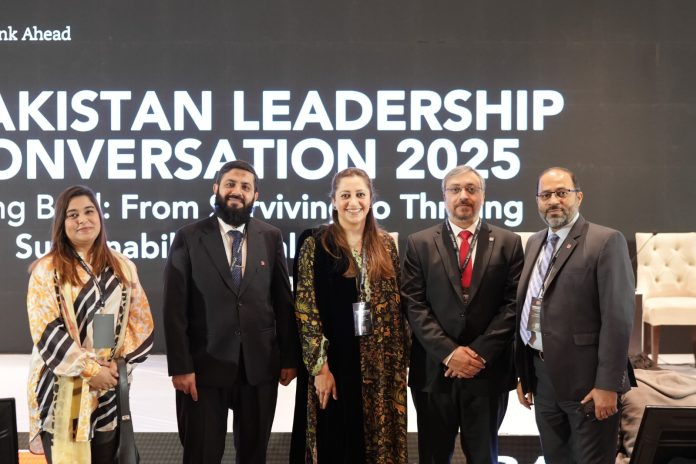Islamabad, 13 February 2025 – The Association of Chartered Certified Accountants (ACCA) successfully hosted the Pakistan Leadership Conversation (PLC) 2025 in Islamabad, uniting policymakers, industry leaders, and finance professionals to explore sustainability, artificial intelligence (AI), and shared services—critical drivers shaping Pakistan’s economic future.
Under the theme “From Surviving to Thriving: AI, Sustainability & Talent,” the conference highlighted the role of finance professionals in fostering innovation, accelerating exports, and advancing Pakistan’s transition to a green and digital economy.
The event featured a distinguished lineup of speakers. Assad Hameed Khan, Head of ACCA Pakistan, opened with a welcome address, reinforcing ACCA’s commitment to future-proofing finance professionals. Ayla Majid, President, ACCA, delivered a keynote on “Sustainability and Climate Tech in the Age of AI”. She remarked, “AI and sustainability are no longer separate conversations. As finance professionals, we have the unique opportunity to lead the charge in embedding ESG principles into the digital economy, ensuring Pakistan remains competitive in the global marketplace.”
Two high-impact panel discussions explored Pakistan’s economic and business landscape. The first, “Unlocking the SSO Potential: What’s Next?” examined how shared services and outsourcing (SSO) can drive economic growth and digital transformation. Panelists included Sheikh Abdul Qadir, Board Member P@sha & CEO, IDRAK AI, Iftikhar Ahmad Mughal, Partner (Business Advisory Services), PwC, Faisal Arshad, CFO, Telenor Shared Services, Ather Imran, CEO, Sybrid Pvt. Limited and Faheem Piracha, CEO, Hyphen Consultancy. Moderated by Sadia Khan, Head Shared Services, Bestway Consultancy, the discussion focused on AI’s role in boosting Pakistan’s IT and ITeS exports.
The second panel, “From Brown to Green: Innovating in Transition,” addressed Pakistan’s shift to a low-carbon economy, ESG-led business models, and AI-driven sustainability. The panel featured Taimoor Farid, Director Finance & Strategy, Mobilink Microfinance Bank, Navid Goraya, Chief Investment Officer, Karandaaz Pakistan, Mussarat Jabeen, Executive Director, SECP, Naghma Tehniat, Governance and Economic Adviser, FCDO and Zia ul Mustafa Awan, Chairman Strategic Board, ICMA Pakistan. Jahanara Sajjad, Executive Director, Bibojee Group, moderated the session, which explored AI’s impact on ESG compliance, carbon markets, and sustainability reporting.
Assad Hameed Khan, Head of ACCA Pakistan, echoed this sentiment, noting, “PLC 2025 is a vital platform for shaping the future of finance and business in Pakistan. With AI redefining shared services and sustainability becoming a necessity, it is essential to equip professionals with the skills to lead this transition.”
Guest of Honour Muhammad Arif Goheer, Executive Director, GCISC, delivered a keynote on “Carbon Market Policy: Pakistan’s Commitment to Net-Zero,” stating, “Achieving net-zero requires collaboration across sectors. AI and carbon market policies will be key to Pakistan’s sustainable future.”
Another esteemed Guest of Honour, Akif Saeed, Chairman, SECP, shared his thoughts via video message, stating, “Strong governance and regulatory frameworks are crucial for ESG and AI adoption. Finance professionals must ensure transparency and sustainability in business.”
Asad Malik Mahmood, Head of Business Development North, ACCA, delivered the closing remarks, expressing gratitude to all partners and ACCA’s leadership for making PLC 2025 a success. He emphasized that AI, sustainability, and talent are not just trends but imperatives shaping the future of finance.
With the collaboration and invaluable support of ACCA’s esteemed partners, PLC 2025 fostered meaningful dialogue on Pakistan’s economic transformation. As ACCA continues to equip finance professionals with future-ready skills, the conference reinforced its commitment to driving a progressive, technology-enabled, and sustainable economic future for Pakistan.
-Ends-

















